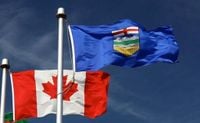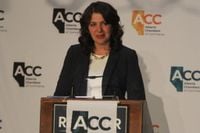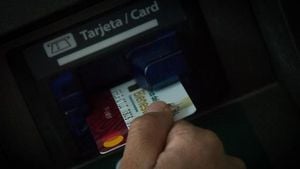In a bold political move, Alberta’s government has introduced a bill that could significantly lower the barriers for citizens wanting to initiate a referendum, including potentially one on separating from Canada. This announcement came just a day after the Liberal Party, led by Prime Minister Mark Carney, secured a fourth consecutive term in the federal elections.
On April 29, 2025, Alberta Premier Danielle Smith declared that the proposed Bill 54 would lower the threshold for a citizen-led referendum from the current 20 percent of eligible voters to just 10 percent of those who voted in the last election. Additionally, the bill extends the time frame for gathering signatures from 90 days to 120 days. Smith emphasized that the introduction of the bill was planned regardless of the election outcome, stating, “We were going to introduce it regardless of what the outcome was.”
While Premier Smith has expressed a desire for Alberta to assert its sovereignty within Canada, she has simultaneously acknowledged the potential for a referendum if enough citizens wish to pursue that path. “I believe in Alberta sovereignty within a united Canada,” Smith affirmed, adding that she does not want to prejudge what questions might be put to voters.
The political landscape in Alberta is charged, with the opposition Alberta NDP accusing Smith of flirting with separatism. Former Calgary mayor Naheed Nenshi challenged her directly, saying, “If you’re going to flirt with separatism, call a referendum. Just do it and let’s see what Albertans have to say.” He added a pointed remark, “And by the way, premier, when you lose that referendum, please leave public life forever.”
Polling data indicates a significant portion of the population is receptive to the idea of separation. Nearly one-third of Albertans (30 percent) expressed a desire to separate from Canada if the Liberals were re-elected. This sentiment has fueled discussions and plans, including an independence rally scheduled for the upcoming Saturday at the Alberta legislature.
Adding to the separatist rhetoric is Cameron Davies, the newly elected leader of the Republican Party of Alberta. He has pledged to hold numerous town halls to promote the idea of Alberta divorcing from Canada, claiming, “After decades of attempts at reconciliation with the rest of Canada, now is the time to end the abusive and toxic relationship with Ottawa and the east that we find ourselves in today.”
However, political analysts like Graham Thomson caution against the feasibility of such separation. “It’s a pipe dream,” he remarked, suggesting that while Alberta politicians may use separation as a rhetorical tool against the federal government, the actual likelihood of it occurring remains slim.
As the Alberta government prepares to discuss the implications of Bill 54, Premier Smith has also taken the opportunity to address her relationship with the newly elected Prime Minister Carney. In a press conference, she congratulated him on his victory and invited him to work collaboratively to reset the relationship between Ottawa and Alberta. Smith articulated her grievances, stating, “The federal government has taken hostile actions against Alberta and against the Constitution and against our right to develop our resources.”
She reiterated her commitment to fight for Alberta’s interests and expressed frustration that the same federal government, which she claims has attacked Alberta’s economy for the past decade, has been returned to power. “As premier, I will not permit the status quo to continue,” she declared.
In a list of demands presented to Carney, Smith has indicated that she seeks a more respectful partnership with the federal government, one that acknowledges Alberta’s economic significance. “The ball will be in his court to see how he responds to that,” she said, emphasizing that she expects meaningful action rather than mere rhetoric.
The Alberta NDP, meanwhile, is also navigating its own political waters. Nenshi has suggested that the provincial party may consider breaking ties with its federal counterpart, a decision expected to be made at the upcoming provincial convention. He highlighted the financial and policy independence of the provincial NDP while acknowledging the contributions of federal leader Jagmeet Singh in advancing social issues.
In response to Smith’s separatist overtures, Nenshi called for unity, insisting that the future of Alberta lies in collaboration with the federal government rather than division. “Canadians are tired of the endless political fights,” he stated. “This is not the time to gamble with the future of our province.”
As the political climate in Alberta evolves, former MP Preston Manning has voiced concerns that the Liberal government’s continued tenure could exacerbate feelings of alienation among Western provinces. He mentioned that consultations are underway to explore the formation of a Canada West assembly, aimed at providing a platform for discussing the unique challenges facing Western Canadians.
With the United Conservative Party (UCP) holding a majority in the Alberta legislature, Bill 54 is expected to pass swiftly, potentially becoming law within months. This legislative change could pave the way for more referendums in the province, further igniting discussions about Alberta’s future within Canada.
Looking ahead, the Alberta government will convene a caucus meeting on May 2, 2025, to discuss the election results and the implications for the province. As Premier Smith continues to assert Alberta's rights and interests, the political landscape remains charged with possibilities, and the voices of Albertans will undoubtedly shape the province’s path forward.





